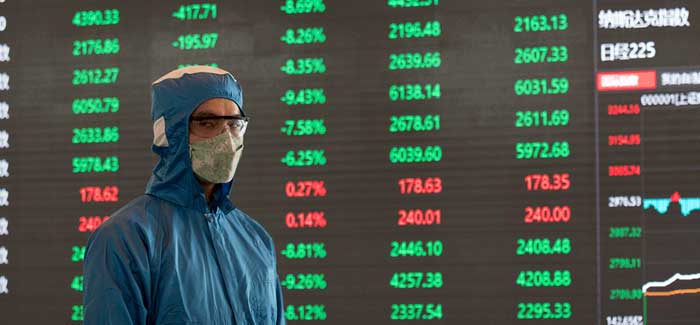How the world’s economy and supply chains are being affected by the Coronavirus
China contributes to about one-third of global economic growth. Clocking at just over 6.1% last year, China’s economic growth rate is already the lowest it’s been in the last three decades. Experts have predicted that even if the virus outbreak is short-lived, it will still have a long-lasting impact on the country’s stock market, economic growth, supply chains, trades, and overall growth.
As the US stock market recovers from the tumble it had on Friday and the markets gyrate unpredictably, it looks like Coronavirus will keep impacting the global economy. Here is what has happened since the outbreak:
- Oil prices: Fell more than 20%.
- Copper: Fell by about 13%.
- Iron ore: Prices have come down to as low as around $10 per ton
- Soybeans: The commodity was supposed to benefit from the US-China trade deal but ended up falling by around 8%.
- Treasury securities: The three-month interest rates have now soared to values higher than two-year and five-year rates-something that signals possible economic slowdown.
- Wuhan and Hubei province, China: In the world’s largest-ever quarantine event, more than 50 million people are in lockdown, and no business is being conducted.
One more reason for the economic slowdown will be the lack of tourism in China – lots of countries around the world have already stopped flights to China, and it looks like things will be this way for a while now. It’s been confirmed that more than 17,000 cases, China has more than 90% of the infected, with only a handful being elsewhere. - The Chinese stock market: Even after the authorities administering an injection of $US173 billion of liquidity into their financial markets on Monday, the Chinese stock market experienced it’s the steepest one-day-fall since 2015 – by a figure of around 8%.
- The state of business in China: In addition to MNCs and SMEs being closed down—especially in areas where the outbreak is prevalent—around 2,000 Starbucks, hundreds of McDonald’s and other fast-food restaurants, 130 Uniqlo shops, 30 Ikea stores, and countless malls remain closed. Car companies like Volvo, Volkswagen, Toyota, BMW, and Tesla have extended their production breaks. Travel companies have halted their operations, and China’s biggest oil refinery has reported that due to a lack of demand, they had to cut down their production by 600,000 barrels a day.

Wuhan and Hubei are one of the key hubs for logistics as well as manufacturing. With the outbreak showing no signs of simmering down, experts suggest that conditions might not look very well for another three weeks. The tragedy has weakened the economic growth of China considerably – and become the reason for initiatives from the government to look for other unions and counties for medical, as well as financial help. Other medical epidemics have been short-lived (SARS and bird flu, for example). But looking at the extremities of the Coronavirus, it has been predicted by the experts that whether it is contained within the next couple of weeks or it takes more than a month, it has already affected the first half of markets to be extremely volatile.







